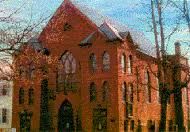Baptist African American residents of Washington, D.C.’s Georgetown neighborhood have been holding religious services in private homes for about five years. Today, finally, the meetings lead to the foundation of the First Baptist Church of Georgetown, thanks to the leadership of the Rev. Sandy Alexander, a former slave.
Originally from Virginia, Alexander’s master brought him to D.C. at a young age. Receiving some education, he was converted to the Baptist faith at the age of twelve. He remained a slave until freedom was bestowed upon him at age 25, following the death of his master. One year afterward, Alexander began studies at Columbian College and was soon ordained as a Baptist minister. Eventually, he purchased the freedom of his then-enslaved wife and children.
Arriving in Georgetown in 1856, Alexander set about to establish a Baptist church. At that time, he could only find two African Baptists in the community. Yet in the years following, many other Baptists moved to Georgetown, resulting in a thriving African Baptist community by 1862 that in turn allowed Alexander to establish the church he had long dreamed of founding, mere weeks after U.S. President Abraham Lincoln publicly announced his Preliminary Emancipation Proclamation.
First Baptist Church of Georgetown thrives during the war years, as members build a meeting house, dubbed the “Ark,” on the corner of 29th and O streets on donated land. Growing rapidly in the post-war years, the congregation builds a new building, for which Alexander solicits funds from Northern Baptists, in addition to obtaining a loan. The cornerstone is laid in 1882, and the building, much of it constructed by church members, completed in the years following. Altogether, Alexander serves as pastor for 37 years, and the church is debt free by the time of his retirement.
Source: First Baptist Church Georgetown, National Park Service records (link); First Baptist Church of Georgetown website (link); “The First Baptist Church of Georgetown,” African Registry, including photo (link); see also Lesko, Babb, Gibbs, Black Georgetown Remembered: A History of Its Black Community From the Founding of the “Town of George” in 1751 to the Present Day, Georgetown University Press, 1991 (link)



